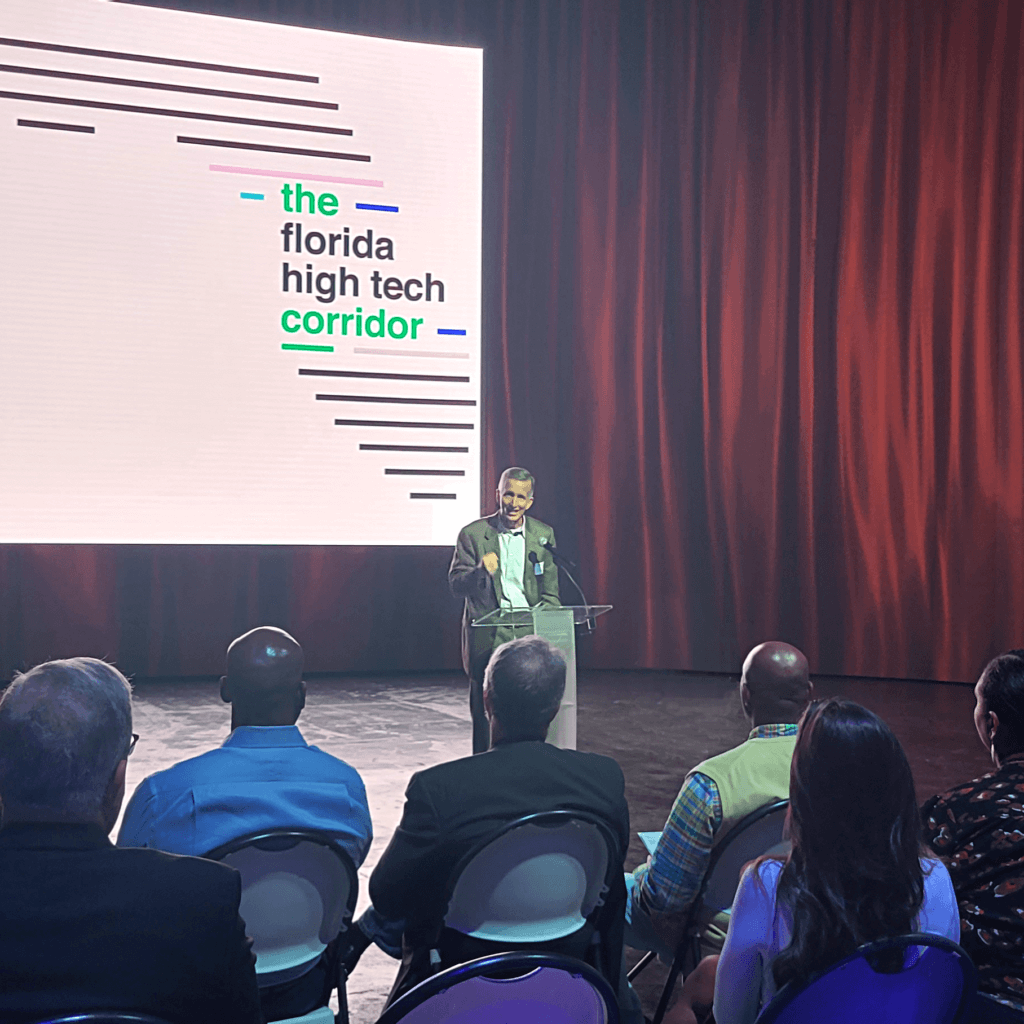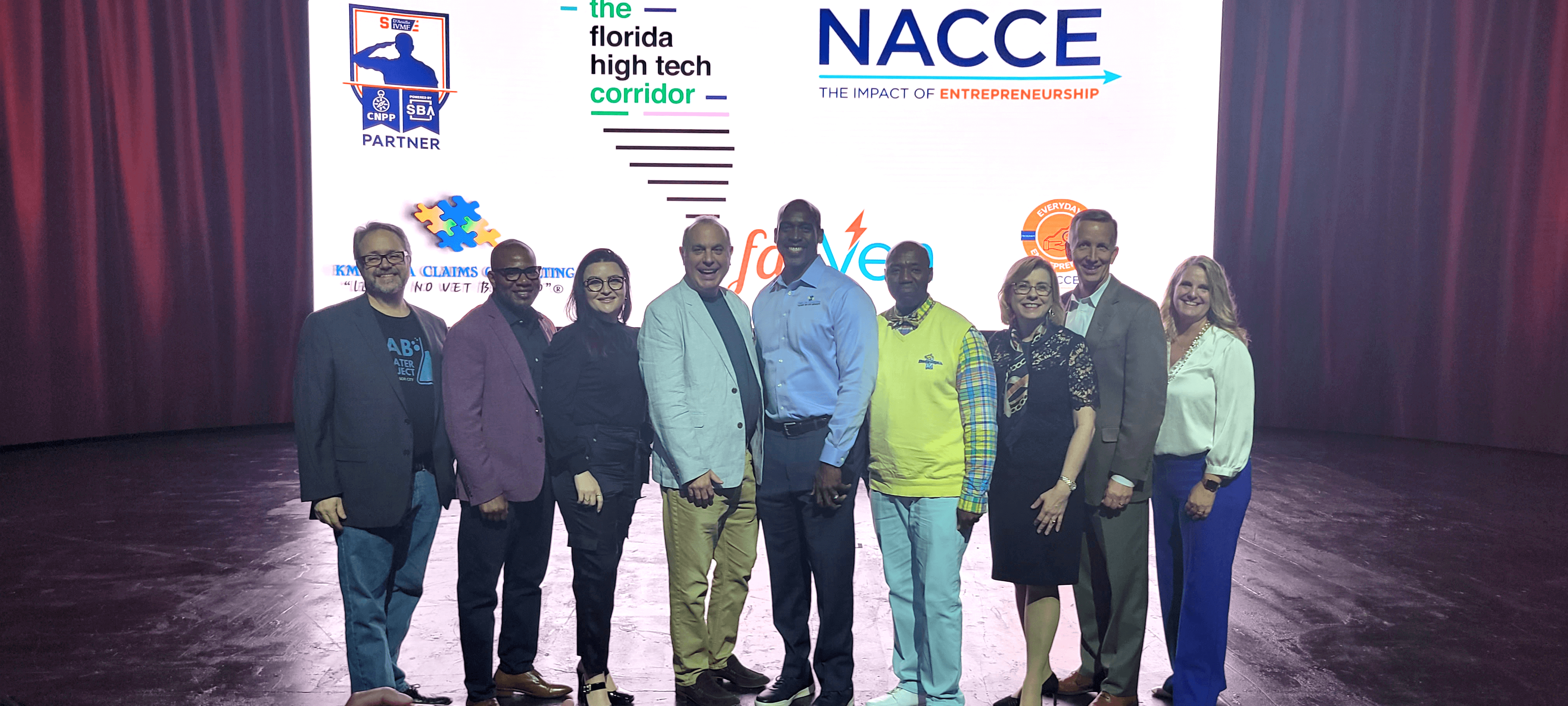#main-content .et_pb_button_module_wrapper a {font-weight:initial;text-decoration:initial;color:initial;}
/* #main-content .et_pb_title_featured_container {display:none;} */
#main-content .et_pb_with_background a {font-weight:initial!important;text-decoration:initial!important;}
#main-content h4 {padding-top:12px;}

Paul Sohl speaks at NACCE Collaboration Tour Kick-Off at Vū Orlando
Surrounded by an immersive LED screen displaying a two-story-tall Florida High Tech Corridor logo, CEO Paul Sohl looked out at an audience of colleagues, team members, entrepreneurs, and their supporters, and relayed a phrase that drove his approach from Day One:
“Go where the energy is.”
That simple mantra led Sohl, and with him The Corridor, to a relationship with the National Association for Community College Entrepreneurship (NACCE). NACCE is the nation’s leading organization for co-creating and distributing resources for community colleges, engaging their member institutions through entrepreneurial thinking and innovative action. NACCE serves over 330 community and technical colleges, along with over 3,000 faculty, staff, administrators, and school presidents who oversee more than 4 million students. The energy is building; NACCE is among the top 3% of public charities and they continue to use their influence to improve the lives of entrepreneurs.
Paul Sohl was speaking at the NACCE Collaboration Tour Kick-Off in Orlando, under the glowing aura of the LED Volume at Vū Orlando. The Tour is a nationwide celebration of community colleges and their collaborations to support local economies. Community colleges have proven vital at engaging non-traditional members of ecosystems across the country, focusing on local innovators, developing diverse perspectives, and reaching across barriers.
“Community colleges are at the forefront of innovation and entrepreneurship in America,” said Rebecca Corbin, president and CEO of NACCE. “Tour stops will showcase the talent of America’s community college students who light up local economies and provide workforce solutions through high-tech, agriculture, and Main Street startups that are supported by college faculty and mentors.”
In its 10 stops across six states, the Tour will feature various events, including press conferences, local business tours, student business highlights, the signing of a Collaboration Pledge, and networking opportunities. “As an organization dedicated to catalyzing the work of three research universities, community and state colleges throughout a 23-county region, as well as industry, government, and nonprofits to accelerate innovation, and drive high-tech entrepreneurship, we’re excited to partner with NACCE and to be part of the National Collaboration Tour,” said Sohl. “What a great opportunity to spotlight the positive impact community colleges are having on regional economies across America.”
The Orlando Tour stop highlighted the efforts of veteran entrepreneurs and served as a platform for announcing expanded funding initiatives for NACCE. A slate of regional entrepreneurs shared their experiences seeking and receiving support for their businesses, which spanned sectors from human performance to government consulting, and from real estate to theater. They took turns echoing the message of collaboration that is vital to The Corridor’s vision for the future of Florida’s techscape.
NACCE followed with a pair of funding announcements that will open the door for community colleges nationwide to engage with business owners. The Everyday Entrepreneur Fund, designed to provide capital for veterans and underserved populations, will now be available in 50 NACCE member colleges nationwide, up from nine last year. NACCE also announced that it had been selected by Syracuse University’s Institute for Veterans and Military Families to receive funding through the Community Navigator Pilot Program. NACCE will receive $200,000 to support veteran and military spouse businesses.
After the Orlando event, Sohl traveled with NACCE north to the tour’s second stop in the Sunshine State, at Tallahassee Community College (TCC). At the Capital, The Corridor and NACCE teams learned about TCC’s entrepreneurial support systems and the school’s Wakulla Environmental Institute, which are responsible for improving the Apalachicola environment and creating over 150 jobs.
The ability of community colleges to engage locally and regionally continues to power community-driven innovation and help ensure everyone a seat at the table. Partnering with a national organization supporting community colleges, one that is energizing entrepreneurs and producing results will provide The Corridor with another way to assist diverse ecosystems.
Part of the mission of The Corridor is to connect, collaborate and convene. Over two Florida stops, the NACCE Collaboration Tour provided an opportunity to do all three. Under the glow of a massive LED screen and on a boat in Apalachicola Bay, some of the most innovative minds in the state came together. NACCE and The Corridor catalyzed the energy of those innovative minds; in what followed, connections were made and collaborations were ignited, made possible by convening the talents and ideas of future-focused Floridians.

An economic development initiative of three research universities—the University of Central Florida, the University of South Florida, and the University of Florida—The Florida High Tech Corridor converges and catalyzes the capacity of high-tech, innovative, and bright minds across a 23-county region to generate a global ripple effect that advances the lives of people in the communities it serves. Powered by an ethos of collaboration, The Corridor aligns opportunities and resources in academia, industry, and economic development to unleash the region’s expotential.
Connect with The Corridor on LinkedIn, Facebook, and Twitter. Learn more at floridahightech.com and subscribe to our newsletter.
The post The Corridor and NACCE Collaborate to Highlight Community College Entrepreneurship appeared first on Florida High Tech Corridor.
